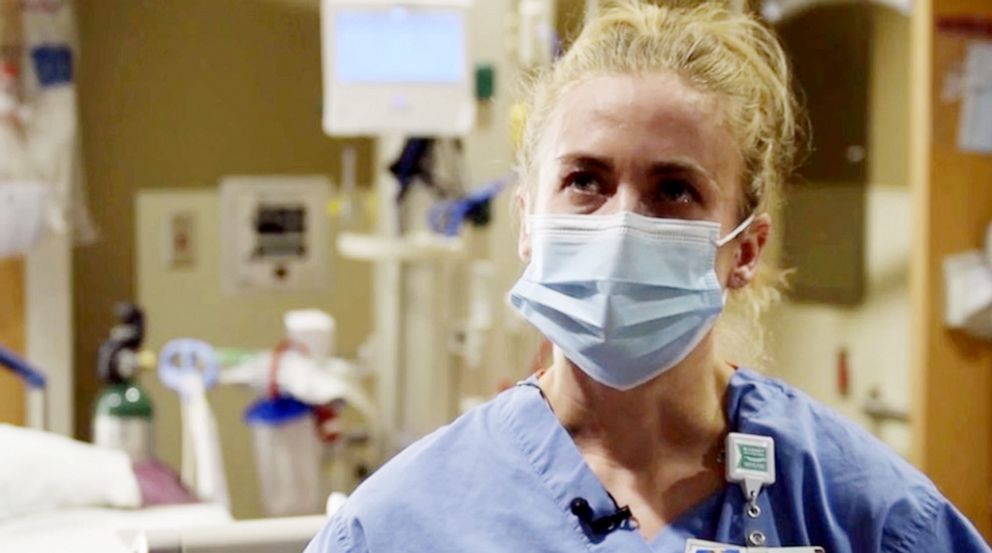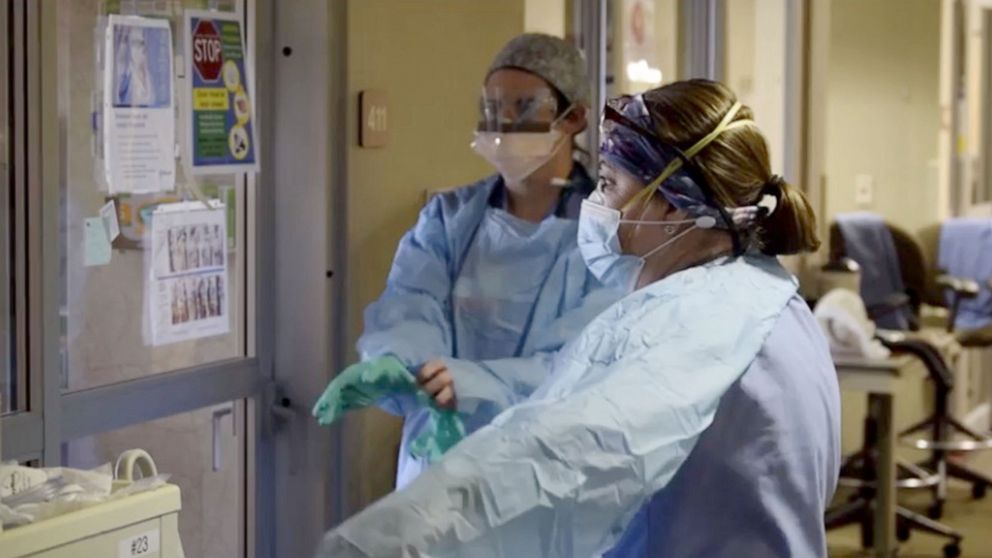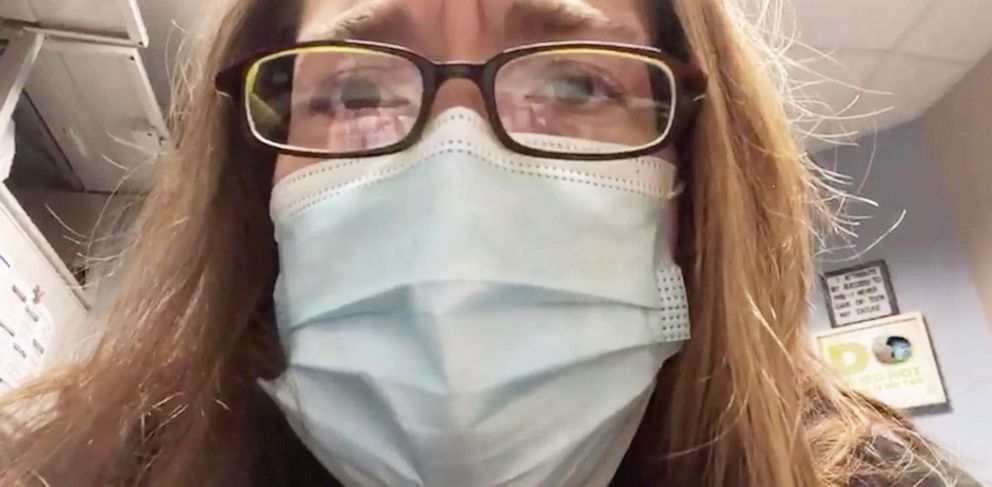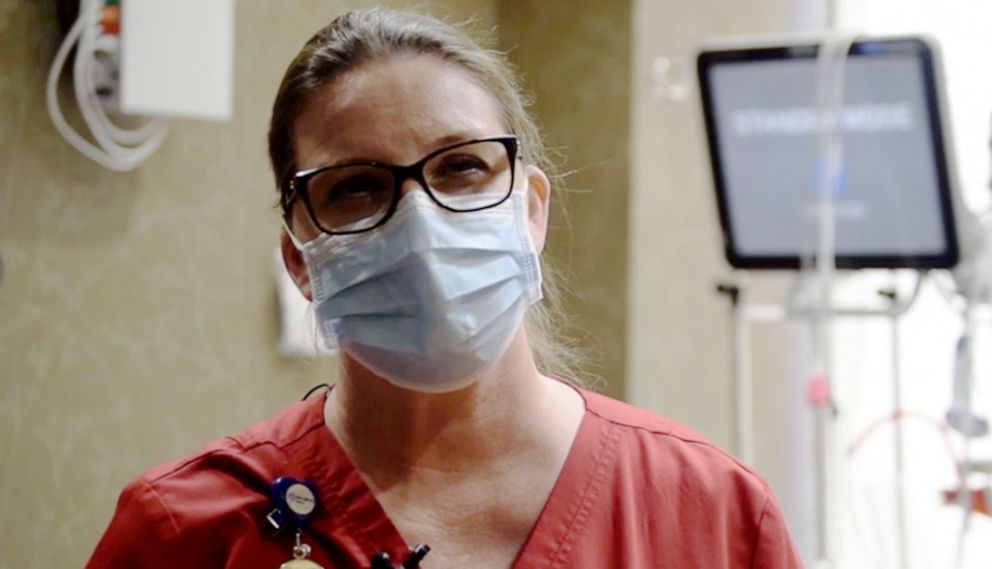What it's like to be an ICU nurse right now during the pandemic
"I'm scared that we're not going to be able to take care of people."
Demoralizing. Exhausting. Frustrating. Scary.
Those are some of the words used by two nurses in two intensive care units used to describe their experiences right now during the pandemic, treating critically ill COVID-19 patients.
As cases continue to surge, those feelings have only intensified.
"I'm scared that we're not going to be able to take care of people," Sarah Grabauskas, an ICU nurse at St. Luke's Meridian in Meridian, Idaho, said last month, as 75% of her unit was COVID-19 patients. "I am fearful that the numbers will be so high that we can't do our best by people, and that there won't be room for people for even diseases other than COVID."

Her colleague, Kari Ferrera, has noticed colleagues' stress levels respond in kind as cases decreased before once again increasing.
"It's like a heavy weight. I feel like it's been demoralizing for our staff," Ferrera said.
Inside the ICU
Seeing patients taken off ventilators and coming out of medically induced comas, scared and confused and fighting the virus alone without their families by their sides, has been especially challenging, the nurses said.
"As a care provider, you're trying to meet those social and spiritual needs that the patient has, and their support system is not there," Ferrera said. "It's not just the physical strain and the emotional strain, but it's everything together."

The hospital has iPads so that patients can communicate with their families. Ferrera also has used them so loved ones can say goodbye to responsive or unresponsive patients.
"It's always hard to have a death," she said. "Twenty-five years of nursing, there's no death that is easy. But it's a little bit better when the family members can be there."
For Brandie Kopsas-Kingsley, an ICU nurse at Indiana University Health University Hospital in Indianapolis, it's hard to wrap her head around the number of people who have died from COVID-19 in the U.S. -- now over 277,000.
"I can't touch numbers," she said late last month. "But as a frontline health care worker ... I can understand the humans behind those numbers. And that every single one of those was a life, and a person that mattered, and a person that is gone."

When COVID hits home
Grabauskas feared she would lose her own mother to COVID-19 when she was hospitalized with the virus in March.
"It was just terrifying -- keeping my phone on high volume, waiting for the phone call that she was gonna need to be intubated," Grabauskas said. "You keep thinking in your mind, 'Did I say enough? Did she know that I love her?'"
Ultimately, her mom's condition improved, but it took her about four to five months to recover, the nurse said.
Ferrera, who has asthma, also was personally affected by COVID-19 -- she and her family had it.
"I wear a mask 12 to 14 hours a day. It is hard. But watching my stats drop into the 80s when I had COVID is harder," she said. "Not being able to breathe with that, it's much harder than just my typical asthma attack."

While they are fearful about what the next few weeks will look like in their units, the nurses are also proud to do their work -- and grateful they and their families are now healthy.
"I'm happy to be here. I love my patients, I love the family members. And I think my coworkers are incredible," Grabauskas said. "I've had a resurgence of a sense of purpose."
'We can all be heroes'
Nurses like Grabauskas, Ferrera and Kopsas-Kingsley have been rightfully praised as "health care heroes." But "we all can be heroes," Grabauskas said, "just by doing one little thing -- and that's just wearing a mask and keeping our 6 feet."
"This is all in our hands," Kopsas-Kingsley said. "We can't start showing you the videos of these patients. ... But I can tell you there's a lot of people suffering. And it's not just about dying. There are countless more that will have lifelong disabilities from this, not just physical or mental but also financial."
Ferrera has a similar message, as cases and hospitalizations peak across the country -- and are only expected to rise in the coming weeks due to Thanksgiving travel.
"I would really like to just plead with the public to cover your face, sanitize your hands and social distance. It does make a difference. It will save lives, it has," she said. "We've done it before, we've watched the numbers drop. This is something that we need the community to help us to save lives."
What to know about the coronavirus:
- How it started and how to protect yourself: Coronavirus explained
- What to do if you have symptoms: Coronavirus symptoms
- Tracking the spread in the U.S. and worldwide: Coronavirus map
Tune into ABC at 1 p.m. ET and ABC News Live at 4 p.m. ET every weekday for special coverage of the novel coronavirus with the full ABC News team, including the latest news, context and analysis.




